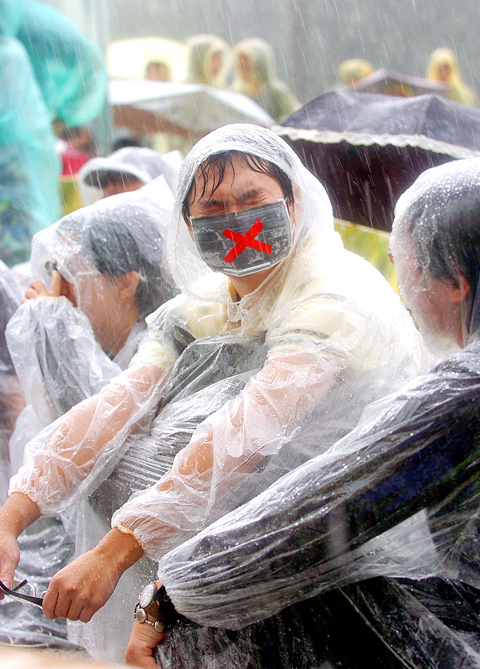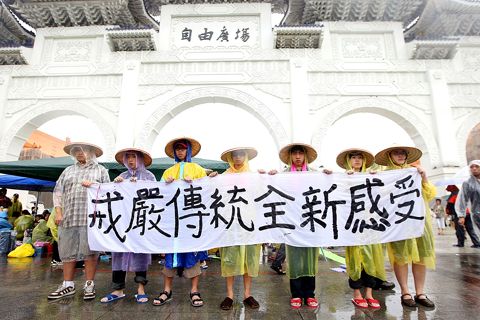“We want human rights!” chanted students at National Taiwan Democracy Memorial Hall as they continued their sit-in for a third day, demanding an apology from the government over what they called the “rough” tactics used by police to deal with protesters during the visit by China’s Association for Relations Across the Taiwan Strait Chaiman Chen Yunlin (陳雲林) last week.
Despite the poor weather yesterday, more than 100 students wore simple raincoats and remained sitting in protest in the Taipei rain.
The first two days of the sit-in protest saw hot, humid weather. Yesterday, downpours began at around 10am.

PHOTO: LO PEI-DER, TAIPEI TIMES
“The first trials of the weather have started, but despite our efforts, no one has stepped up to respond to our demands,” Hsu Ching-fang (許菁芳), president of the National Taiwan University Student Association, said to the crowd of students in the rain.
About 400 students, led by assistant professor of sociology at National Taiwan University Lee Ming-tsung (李明璁), started the sit-in in front of the Executive Yuan on Thursday at noon. The students believe that police, while protecting the safety of Chen and his delegation, acted improperly and that freedom of speech had been suppressed.
The student demonstrators were forcibly evicted by police from the front gate of the Executive Yuan on Friday night because they had not applied to conduct a protest there.

PHOTO: CNA
The students linked their arms together and refused to leave. Police had to take them away to nearby police vehicles, and then drove them to National Taiwan University.
Some students later reconvened in Liberty Square at National Taiwan Democracy Memorial Hall to continue the sit-in.
“Police officers have engaged in numerous abusive acts against peaceful protesters from various dissenting groups, under the guise of ‘keeping the peace,’” read an English statement issued by the students. “These acts have included arbitrary searches and prohibitions, seizure and destruction of property, physical assault, dispersion, and even arrest and detention.”
“Through reports in the media, we have come to realize the seriousness of the current situation. It is no longer a technical question of excessive law enforcement tactics, nor is it simply a partisan issue between supporters of various political parties. This is a proliferation of state-sponsored violence that is provoking and attacking civil society. All these oppressive acts, which ignore human rights and democratic values, are reminiscent of martial law,” the statement said.
The students yesterday insisted that they would continue with the sit-in protest until their three appeals were met: an open apology from President Ma Ying-jeou (馬英九) and Premier Liu Chao-shiuan (劉兆玄) to all citizens, the resignations of National Police Agency Director-General Wang Cho-chiun (王卓鈞) and National Security Bureau Director Tsai Chaoming (蔡朝明) and the swift amendment of the Assembly and Parade Law (集會遊行法).
Some observers compared the sit-in to the Wild Lily Student Movement (野百合學運) of 1990, which started as a student movement that eventually drew hundreds of thousands calling for political reforms, including the abolition of the National Assembly.
The protest this time not only brought students from different schools to the sit-in, but also redefined social movements as the students used the Internet to promote their appeal.
They have launched Internet petitions and set up live streaming videos with audiences all over Taiwan and in the US, Japan, Holland and Germany.
TAKE TURNS
The students have taken turns hosting the event in various languages. They also opened lines for call-ins during the night.
Sitting with the students, Lee said: “Taiwan’s youth still care about public issues, only nowadays, they are using new channels to voice their concerns.”
The Taipei City Government yesterday urged the student demonstrators to complete the legal processes for holding the protest.
Yang Hsiao-tung (羊曉東), the city government’s spokesman, said the sit-in protest, which was organized by students and has continued for more than one day, was an illegal demonstration.
He urged the students to apply with the city government for a rally permit to turn the sit-in into a legal protest.
“As the illegal protests during the past week have caused social instability, we urge the students to follow the law and apply for rally permits to prevent unnecessary confrontations between the police and protesters,” he said at Taipei City Hall.
Yang said the city government would grant the students a rally permit if they filed applications according to regulations.
Meanwhile, the Democratic Progressive Party yesterday lent support to the students, and urged Ma to deliver on his campaign promise to change the Assembly and Parade Law so that notification would be enough to stage a protest rather than having to apply first with authorities.
ADDITIONAL REPORTING BY MO YAN-CHIH, JIMMY CHUANG AND CNA

The CIA has a message for Chinese government officials worried about their place in Chinese President Xi Jinping’s (習近平) government: Come work with us. The agency released two Mandarin-language videos on social media on Thursday inviting disgruntled officials to contact the CIA. The recruitment videos posted on YouTube and X racked up more than 5 million views combined in their first day. The outreach comes as CIA Director John Ratcliffe has vowed to boost the agency’s use of intelligence from human sources and its focus on China, which has recently targeted US officials with its own espionage operations. The videos are “aimed at

STEADFAST FRIEND: The bills encourage increased Taiwan-US engagement and address China’s distortion of UN Resolution 2758 to isolate Taiwan internationally The Presidential Office yesterday thanked the US House of Representatives for unanimously passing two Taiwan-related bills highlighting its solid support for Taiwan’s democracy and global participation, and for deepening bilateral relations. One of the bills, the Taiwan Assurance Implementation Act, requires the US Department of State to periodically review its guidelines for engagement with Taiwan, and report to the US Congress on the guidelines and plans to lift self-imposed limitations on US-Taiwan engagement. The other bill is the Taiwan International Solidarity Act, which clarifies that UN Resolution 2758 does not address the issue of the representation of Taiwan or its people in

US Indo-Pacific Commander Admiral Samuel Paparo on Friday expressed concern over the rate at which China is diversifying its military exercises, the Financial Times (FT) reported on Saturday. “The rates of change on the depth and breadth of their exercises is the one non-linear effect that I’ve seen in the last year that wakes me up at night or keeps me up at night,” Paparo was quoted by FT as saying while attending the annual Sedona Forum at the McCain Institute in Arizona. Paparo also expressed concern over the speed with which China was expanding its military. While the US

SHIFT: Taiwan’s better-than-expected first-quarter GDP and signs of weakness in the US have driven global capital back to emerging markets, the central bank head said The central bank yesterday blamed market speculation for the steep rise in the local currency, and urged exporters and financial institutions to stay calm and stop panic sell-offs to avoid hurting their own profitability. The nation’s top monetary policymaker said that it would step in, if necessary, to maintain order and stability in the foreign exchange market. The remarks came as the NT dollar yesterday closed up NT$0.919 to NT$30.145 against the US dollar in Taipei trading, after rising as high as NT$29.59 in intraday trading. The local currency has surged 5.85 percent against the greenback over the past two sessions, central